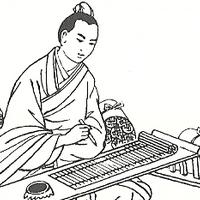《史记 》第二卷 :夏 本纪
Die Aufzeichnungen des großen Historikers, Band II: Xia Benji
"Historical Records" Volume II: Xia Benji
太史傳 第二巻 夏辨記
역사 기록, 2권: 하본기(夏本纪)
Zapiski wielkiego historyka, tom II: Xia Benji
Записи Великого Историка, том II: Ся Бэньцзи
《史记 》第二卷 :夏 本纪
夏朝 的 开创者 是 大禹 。
The founder of the Xia Dynasty was Daxie.
相传 大禹 和 他 的 父亲 繇 都 是 负责 治理 洪水 的 。
It is said that Dayu and his father Yao are responsible for flood control.
繇 的 思路 是 哪里 发生 洪水 , 他 就 带领 大家 去 堵 哪里 。
His idea is that where floods occur, he leads everyone to stop them.
然而 , 经过 9 年 的 努力 却 一无所成 , 洪水 依旧 泛滥 。
However, after nine years of hard work, nothing has happened and the floods are still flooding.
大禹 的 基本思路 是 疏浚 河道 , 使大 的 河流 能 顺利 汇入 大海 , 小 的 河流 能 顺利 汇入 大河 。
Dayu ’s basic idea is to dredge the river, so that large rivers can smoothly flow into the sea, and small rivers can smoothly flow into the large river.
经过 多年 的 努力 , 大禹 最终 取得 了 成功 , 也 留下 了 许多 关于 大禹治水 的 传说 , 如 “ 三过 家门 而 不 入 ”。
After years of hard work, Daxie has finally achieved success, and has also left many legends about Dagu's water control, such as “three over the door and not entering”.
意思 是 说 大禹 带领 大家 治理 洪水 非常 的 忙碌 , 从 自己 家门口 经过 三次 都 没有 时间 进去 休息 一下 。
||||||||||busy|||||||||||
It means that Daxie leads everyone to manage the floods very busy. After three times from their doorstep, they don't have time to go in and take a break.
正是 因为 大禹治水 的 功劳 非常 大 ,“ 五 帝 ” 中 的 最后 一位 —— 帝舜 —— 选择 了 大禹 作为 自己 的 继承人 。
It is because Dayu's contribution to water control is so great that the last of the "Five Emperors"-Di Shun-chose Dayu as his heir.
帝舜 去世 后 三年 , 大禹 继承 了 天子 位 。
Three years after Di Shun's death, Dayu inherited the position of emperor.
又 过 了 十年 , 大禹 也 去世 了 。
After another ten years, Daxie also passed away.
在 去世 前 , 大禹 也 效仿 五 帝 , 选择 益 作为 自己 的 继承人 。
Before his death, Daxie also followed the Five Emperors and chose Yi as his heir.
但是 益 跟随 大 禹 的 时间 比较 短 , 又 没有 特别 大 的 功劳 为 自己 树立 威信 。
However, Yi has been following Dayu for a relatively short time, and has not given much credit for establishing his own prestige.
众人 更 愿意 跟随 大禹 的 儿子 —— 启 。
People are more willing to follow Dayu's son, Qi.
于是 , 启 继承 了 天子 位 , 之后 也 将 天子 位 传给 了 自己 的 儿子 。
Thus, Kai inherits the emperor's position, and then passes the emperor to his son.
无论 大禹 本人 有意 还是 无意 , 五帝 时期 的 “ 禅让制 ” 到 了 大禹 终止 了 , 取而代之 的 是 父死子继 的 “ 世袭制 ”。
Regardless of whether the amnesty was intentional or unintentional, the "declining system" of the Five Emperors was terminated by the Dalai, and replaced by the "hereditary system" of the father and the dead.
这种 “ 世袭制 ” 的 规则 一致 持续 到 了 1912 年 中国 最后 一任 皇帝 —— 宣统 —— 退位 。
This "hereditary" rule lasted until the abdication of China's last emperor, Xuan Tong, in 1912.
この「世襲君主制」は、中国の最後の皇帝であるXuantongが退位した1912年まで続きました。
而 中国 也 在 这种 制度 下 走过 了 漫长 的 4000 年 左右 。
China has also gone through a long period of about 4,000 years under this system.
夏朝 包括 大禹 在内 一共 有 大约 17 位 天子 , 最后 一位 是 夏桀 。
There are about 17 emperors in the Xia Dynasty including Datun, and the last one is Xia Wei.
从夏桀 的 曾祖父 开始 , 天子 的 统治 地位 已经 开始 不稳固 了 。
Beginning with Xia Yi's great-grandfather, Tianzi's dominance has begun to weaken.
而夏桀 的 品德 比较 差 , 为 人 也 比较 残暴 。
Xia Yan's moral character is relatively poor, and he is also cruel.
一位 叫 汤 的 贵族 通过 修养 自己 的 品德 , 在 众人 中 树立 了 威信 , 然后 率领 军队 推翻 了 夏桀 。
A nobleman named Tang established a prestige among the people by cultivating his own character, and then led the army to overthrow Xia Wei.
夏朝 的 历史 也 就 从此 结束 了 。
The history of the Xia Dynasty has ended.
取代 夏朝 的 是 第二个 朝代 “ 商 ”。
The Xia Dynasty was replaced by the second Shang.

